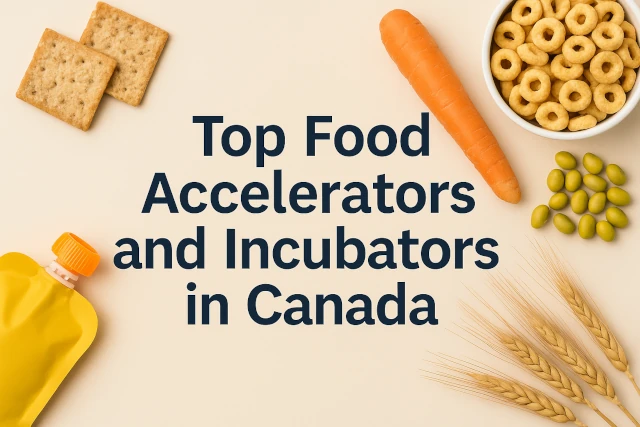Top Food Accelerators in Canada

Introduction
As an entrepreneur who's built and scaled multiple consumer packaged goods (CPG) brands—from artisanal crackers to healthy snacks for toddlers—I understand the rollercoaster of product development, manufacturing, fundraising, and scaling. In the world of food CPG, specialized accelerators and incubators can be vital launchpads. These programs offer tailored mentorship, kitchen facilities, retail networks, regulatory support, and sometimes even funding—all designed to jumpstart growth beyond what a traditional tech startup program might offer.
But food accelerators aren't a silver bullet. Challenges include giving up equity, navigating program fit, managing time alongside product development, and ensuring long-term support post-demo day. In this guide, I’ll unpack the benefits, limitations, and share my top 10 Canadian food-specific accelerators and incubators—detailing what each offers, their terms, and who they’re best for.
Why Food Accelerators Matter for CPG Founders
- Specialized production & kitchen access: Shared facilities tailored to food safety, scaling, and co-packing.
- Regulatory & labeling expertise: Guidance on Health Canada, CFIA, allergen labeling, and nutritional panels.
- Retail and distribution connections: Access to buyers, brokers, and distributor networks already engaged.
- Mentorship from food veterans: Advisors who've lived packaging, logistics, and retail scaling.
- Peer cohort learning: Community of founders tackling similar manufacturing, shelf-life, and scaling questions.
Common Pain Points & Limitations
- Equity or fee commitments: Many programs require equity or upfront payment.
- One-time cohorts: Sustainability kicks in after graduation; ongoing support isn't always guaranteed.
- Cohort fit is key: Some focus solely on early-stage or agri-tech; choose programs aligned with stage + mission.
- Time and resource strain: Startup phases are busy; balancing program workload and real-world product challenges is tough.
- Geographic limits: Ontario-centric programs may lack regional access for founders in Western or Atlantic Canada.
Top 10 Food Accelerators & Incubators in Canada
1. YSpace Food Accelerator (York University, Ontario)
YSpace is York University’s entrepreneurship arm, supporting early-stage food & beverage CPG startups via a hands-on 4–5 month cohort. According to its program outline, founders refine packaging, pricing, logistics, marketing, HR, and international strategy.
Program Highlights:
- Weekly workshops & peer circles
- Support with labelling, pricing margins, operations, and distribution
- Demo day to pitch to retailers, brokers, and investors
- Access to Export Development Canada insights on U.S. and international expansion
Best for: Founders with early traction and basic packaging completed seeking foundational operations & go-to-market muscle.
2. Venturepark Labs (Calgary, Alberta)
Venturepark Labs positions itself as “Canada’s top accelerator for food, beverage, health & wellness entrepreneurs.” It offers shared commercial kitchens, private production space, product development aid, and scaling fundamentals.
Program Highlights:
- Commercial kitchens & co-packing ready facilities
- Workshops with industry experts, distributors, and brokers
- Demo Day with retail and investment partners
- Focused mentorship for food & wellness categories
Best for: Western Canada-based startups requiring production facilities and market-ready guidance.
3. THRIVE Canada Accelerator (National)
THRIVE works with agrifood tech startups—blending food, agriculture, and tech innovations. The Canada Accelerator empowers companies with mentorship, investment opportunities, and access to THRIVE’s global network.
Program Highlights:
- Global corporate partners & investor network
- Support for food-tech, agri-tech, and sustainable innovation
- Seed funding, access to pilots, and market validation
Best for: Food-tech or agri-tech startups focusing on digital, sustainability, or ingredient innovations.
4. Agropur InnoAccel (Alberta / National)
Agropur, a major dairy cooperative, launched Inno Accel in late 2018 to drive dairy innovation in Canada. The program wrapped its first cohort in October of that year.
Cohort included:
- U Main (DIY cheese kits)
- Sweetaly Dolceria (Italian desserts)
- SaltiSweet Ice Cream Factory
- Peak Yogurt
- Cheese Grotto (home storage tech)
Best for: Dairy-related consumer brands or ingredient innovators targeting dairy ecosystems.
5. MaRS Discovery District (Toronto, Ontario)
MaRS is North America’s largest urban innovation hub, offering incubation across health, agri-food, and tech. Though less food-specific, its scale and networks are unbeatable.
Program Highlights:
- Incubator space with wet lab capability
- Access to capital and corporate innovation channels
- Workshops on commercialization and scaling
Best for: Science-driven food-tech or food-health hybrids, especially needing lab space or deep research ties.
6. DMZ (Toronto Metropolitan University)
DMZ is the university's prestigious tech incubator—but in 2021 it pivoted toward early-stage support with vertical tracks like Women Founders Fast Track and Black Innovation cohorts. While not food-specific, many CPG-adjacent startups have benefited.
Program Highlights:
- Access across university, tech prototyping, and startup ecosystems
- Equity arrangements are optional; in-kind services are core
- Strong investor and mentor matching platform
Best for: Founders seeking cross-category innovation with tech integration (e.g. D2C platforms), or diverse founder programs.
7. Banting & Best Centre for Innovation
Housed within U of T, Banting & Best accelerates science and deep tech—including biofood, packaging innovation, and ag-tech. As of its 2016 milestone, it operates nine accelerators across sectors.
Program Highlights:
- Wet labs, office & prototyping space
- Private sector mentors and investor events
- Focus often includes med-tech, biotech, but crosses into food-tech
Best for: Food-tech or ingredient startups with R&D or bioprocess needs based in Toronto.
8. York Entrepreneurship Development Institute (YEDI)
Also at York U, this general accelerator provides mentoring and startup support across sectors. Though not food-specific, it’s co-located with YSpace and works well for cross-program participation.
Best for: Food-product founders who want access to broader entrepreneurial resources alongside YSpace.
9. BioEnterprise (National)
BioEnterprise is a community of entrepreneurs and researchers focused on agri-food and agri-tech. They don’t run a single cohort, but offer seed-stage mentorship and a network across Canada.
Program Highlights:
- Connections with researchers, agri-food players & funders
- M&A and commercialization guidance
Best for: Startups centered on ingredient R&D, agri-solutions, or university-commercial partnerships.
10. District Ventures (via Venturepark) & Others
While not solely food‑focused, District Ventures in Calgary (linked to Venturepark) targets consumer goods, including food & beverage founders, offering mentorship, branding support, and capital access. They straddle tech and consumer CPG.
Best for: Consumer-packaged goods brands ready for growth and fundraising beyond kitchen stage.
How to Choose the Right Program
| Goal | Program(s) | Notes |
|---|---|---|
| Production & Co‑packing access | Venturepark Labs, YSpace | Shared commercial kitchens |
| Dairy or food-tech innovation | Agropur, Banting & Best, BioEnterprise | Ingredient, biotech, agri-solutions |
| Validation + distribution readiness | District Ventures, YEDI | Consumer-focused mentorship |
| Capital and investor access | THRIVE, BioEnterprise, MaRS | Broad investor pipelines |
| University and tech ecosystem access | MaRS, Banting & Best, DMZ | Science + tech linkages |
Tips for Getting the Most from an Accelerator
- Assess equity vs support: Some programs take 5–10% equity; others are service-for-equity or free. Know what you're trading.
- Prioritize post-program support: Seek programs offering follow-up mentorship or via alumni networks.
- Align stage to cohort: Don’t apply to advanced programs if you're still testing product-market fit.
- Maximize cohort synergy: Your best learning often comes from peers facing similar regulatory or manufacturing hurdles.
- Prep your pitch: Demo Day matters. Work with mentors on distribution strategy, financials, and packaging pitch decks.
Conclusion
Food accelerators and incubators in Canada offer critical support that bridges the gap between concept and commercial success. Whether you need kitchen space, regulatory know-how, or investor introductions, these ten programs offer diverse access points depending on your CPG journey and niche.
When choosing, match the program to your stage and goals. Be mindful of equity and time investments. Make the program work for *you*: co-packing facilities, regulatory mentorship, demo days—use every resource. I hope this guide as “Adriana” helps you map the accelerator landscape so you can scale your food brand with confidence and clarity.
Cheers to your pantry-filling success!









